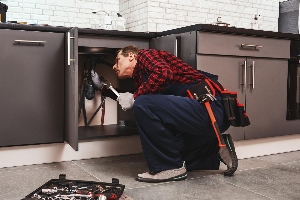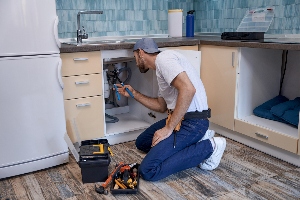A whole house water filter is a comprehensive filtration system designed to purify water at the point of entry, ensuring that every tap in your home delivers clean and safe water. This type of system effectively removes contaminants such as chlorine, lead, and sediment, significantly improving your water quality. By investing in a whole house water filter, you invest in the health and safety of your family’s drinking water.
Understanding the importance of water quality is crucial, especially considering the potential presence of harmful substances in municipal supplies. The right filtration system not only enhances taste and odor but also protects your plumbing and appliances from damage caused by impurities. You can enjoy peace of mind knowing that your entire home benefits from better water.
As you explore the options available for whole house water filters, consider the specific contaminants prevalent in your area. This awareness will guide you in selecting a system that meets your unique needs. Embrace the opportunity to enhance your water quality and ensure a healthier living environment for you and your family.
Understanding Whole House Water Filters
Whole house water filters provide comprehensive filtration for your entire home’s water supply. This ensures the water you use for drinking, bathing, and cooking is clean and safe. The following sections cover definitions, types, and components to enhance your understanding of these systems.
Definition and Purpose
A whole house water filter is a filtration system that treats all incoming water to your home. This system is installed at the point of entry, filtering water before it reaches any faucets or appliances.
The primary purpose is to remove contaminants such as sediment, chlorine, and heavy metals. This can improve the taste, odor, and quality of your water while protecting plumbing and appliances from damage.
Types of Whole House Water Filters
There are several types of whole house water filters, each utilizing different filtration methods:
- Sediment Filters: Remove larger particles like silt and rust.
- Activated Carbon Filters: Use carbon to absorb chlorine, volatile organic compounds (VOCs), and bad tastes.
- Reverse Osmosis Systems: Utilize a membrane to eliminate a wide range of contaminants, including dissolved solids.
- UV Filters: Use ultraviolet light to kill bacteria and viruses without chemicals.
Selecting the right type depends on your specific water quality issues and household needs.
Components of a Filtration System
A typical whole house filtration system consists of several key components:
- Pre-Filter: Captures larger sediments and extends the life of the main filter.
- Main Filter: Often an activated carbon filter or reverse osmosis unit that targets contaminants.
- Post-Filter: Final polish to ensure the water is free of impurities.
- Filter Media: Refers to the materials inside the filters that do the actual cleaning.
These components work together to ensure that every drop of water in your home is clean and safe for use.
Benefits of Whole House Water Filtration
Whole house water filtration systems provide numerous advantages that enhance your health and protect your home. By addressing contaminants and improving water quality, these systems contribute to both wellness and the longevity of your appliances.
Health benefits include:
- Cleaner Water: Filtered water tastes better and is free from unpleasant odors.
- Reduced Contaminant Exposure: Removing harmful substances lowers the risk of health issues like gastrointestinal illnesses.
- Proactive Safety: By filtering viruses and bacteria, your household is less susceptible to infections.
When you drink and cook with filtered water, you ensure the safety of your food and beverages, promoting a healthier lifestyle for you and your family.
Impact on Appliances and Plumbing
Whole house filtration also provides substantial benefits for your appliances and plumbing systems. Hard water contributes to scale buildup, which can damage appliances over time.
Key impacts include:
- Appliance Longevity: Clean water enhances the lifespan of dishwashers, washing machines, and water heaters by preventing mineral deposits.
- Efficient Performance: Filtered water optimizes the functioning of appliances, ensuring they operate effectively.
- Lower Maintenance Costs: Investing in filtration reduces the frequency of repairs and maintenance related to mineral buildup and corrosion.
Ultimately, by choosing a whole house water filtration system, you protect both your health and your home, ensuring a safer and more efficient living environment.
Installation and Maintenance Considerations
When considering a whole house water filter, proper installation and routine maintenance are critical for optimal performance. You'll need to decide between professional installation and a DIY approach, as well as establish a maintenance schedule to ensure your system operates effectively.
Professional vs DIY Installation
Choosing between professional installation and a DIY setup depends on your comfort level with plumbing tasks. A professional can ensure correct installation, tackling issues like water pressure and ensuring plumbing connections are secure. They can also recommend suitable systems for your home’s needs.
If you prefer a DIY approach, consider the following steps:
- Read the manufacturer’s instructions thoroughly.
- Gather necessary tools such as wrenches, screwdrivers, and sealant tape.
- Turn off the water supply before beginning installation.
Ensure your skills match the complexity of the installation. An improper setup can lead to leaks or subpar filtration. The right installation contributes to the longevity of the carbon filters used in the system.
Routine Maintenance Requirements
Regular maintenance is essential for efficient operation of your whole house water filter. Start with a maintenance schedule that aligns with the manufacturer's guidelines. Key tasks include:
- Replacing filters every six to twelve months, depending on usage and water quality.
- Inspecting plumbing connections for any leaks or corrosion.
- Verifying water pressure to ensure optimal filtration performance.
Consider creating a checklist to track maintenance tasks. When neglected, water filters can become less effective, allowing contaminants to bypass the system. For comprehensive solutions, consult professionals for maintenance service or to upgrade your system as needed. Explore options for ongoing support from experts to enhance your water quality. For installation insights, check out Whole House Water Filter.
Filter Media and Performance Indicators
The choice of filter media significantly affects the performance of your whole house water filter. Understanding the filtration efficiency and crucial performance metrics helps ensure that you select the right system for your needs.
Analysis of Filter Media Types
Different types of filter media provide various benefits. Activated carbon filters excel in removing chlorine, sediment, and volatile organic compounds (VOCs). They enhance taste and odor but may have limitations in reducing heavy metals.
KDF (Kinetic Degradation Fluxion) is effective for preventing bacteria growth and removing chlorine and heavy metals. It works via a redox reaction, making it a valuable component in multi-stage systems.
Sediment filters capture larger particles like dirt and rust. Their effectiveness is often measured by micron ratings, which indicate the smallest particle size they can filter. Selecting the right media or combination is vital for your water quality needs.
Understanding Key Performance Metrics
When evaluating a whole house water filter, key performance metrics matter. Filtration efficiency informs you how well the filter removes impurities. Look for filters with NSF certifications, which confirm their performance against industry standards.
Flow rate indicates how much water the filter can process per minute. Ensure the flow rate meets your household's needs.
Capacity reveals how long the filter can function before needing replacement, impacting maintenance costs. Choosing a filter with a suitable micron rating ensures you effectively target specific contaminants without sacrificing water pressure.
Common Water Contaminants in Households
Water coming into your home can carry various contaminants, affecting both its safety and quality. Understanding these contaminants helps you make informed decisions about water filtration and treatment options.
Chemical and Biological Contaminants
Chemical contaminants can originate from multiple sources, including agricultural runoff, industrial discharges, and the use of household products. Key examples include:
- Chloramine: A disinfectant used in municipal water treatment can cause skin and respiratory irritation.
- Heavy Metals: Elements like lead, arsenic, and mercury can leach from plumbing fixtures and contribute to serious health risks.
- Pesticides: Runoff from agricultural areas may introduce harmful chemicals that pose risks to both health and the environment.
- Bacteria: Contaminated water can harbor bacteria such as E. coli and Salmonella, leading to gastrointestinal illnesses.
These substances can significantly impact your health over time, highlighting the need for effective filtration solutions.
Physical and Aesthetic Impacts
Physical contaminants can affect the appearance, taste, and smell of your water. Common issues include:
- Sediment: Dirt, sand, and rust can enter your water supply through aging pipes, leading to discoloration.
- Hard Water: High mineral content, primarily calcium and magnesium, can lead to scale buildup in plumbing and appliances.
- Odor and Taste: Your water may have unpleasant smells or flavors from organic material or chloramines, impacting its palatability.
Addressing these contaminants can improve your water quality and enhance your overall experience. Investing in a whole-house water filter can effectively reduce both chemical and physical contaminants, ensuring cleaner, better-tasting water for your family.
Selecting the Right Filter for Your Home
Choosing the appropriate whole house water filter is critical for effective home water treatment. Factors to consider include your water source and the specific filtration needs to ensure optimal performance.
Considerations Based on Water Source
Your water source significantly affects the type of filter that is best for your home. If you usecity water, it may contain chlorine, sediment, and other contaminants. A carbon filter can effectively reduce these substances.
For those with well water, the concerns may include bacteria, iron, and higher mineral content. In this case, a filtration system that includes a UV light or reverse osmosis may be necessary.
Assess your specific water quality by obtaining a testing kit. This helps identify contaminants, allowing you to choose a filter tailored to your needs.
Filter Size and Flow Rate Requirements
After determining the contaminants in your water, you need to consider the size and flow rate of the filter system. Flow rate is typically measured in gallons per minute (GPM). Ensure your filter meets the peak water demand of your household.
For example, a household with multiple bathrooms may require a system with a higher flow rate to ensure adequate pressure. Choose a system that matches or exceeds your home’s peak usage to prevent pressure issues.
Consider the size of the filter as well, as larger units often have a higher capacity and require less frequent maintenance. Prioritize a system that balances size, flow rate, and filtration effectiveness to meet your family's specific needs.
Addressing Specific Water Quality Issues
There are various water quality challenges that whole house water filters can effectively tackle. Understanding these specific issues enables you to choose the right filtration methods and maintain better water quality throughout your home.
Solutions for Hard Water Problems
Hard water contains high levels of minerals like calcium and magnesium. These minerals can lead to scale buildup in pipes and appliances, decreasing their efficiency and lifespan.
Water softeners are often recommended to combat these issues. These systems use a process called ion exchange, which replaces hard minerals with sodium ions.
Regular maintenance is crucial to ensure these systems function correctly. You might also consider combining a water softener with other filtration methods to address additional contaminants.
Using a water test kit can help you determine the hardness of your water and select the most suitable solution.
Filtering Volatile Organic Compounds (VOCs)
Volatile Organic Compounds (VOCs) are harmful chemicals found in many household products, including cleaners and paints. Exposure to VOCs can have serious health impacts, making their removal essential.
Activated carbon is an effective filtration method for reducing VOCs. This material has a large surface area, allowing it to adsorb these compounds as water passes through.
It’s vital to replace carbon filters regularly to maintain their effectiveness. You can choose systems designed specifically for VOC removal, ensuring comprehensive protection against these contaminants.
Make sure to select products that are certified for VOC reduction to ensure optimal performance for your home’s water supply.
Impact on Personal Care and Household Use
Using a whole house water filter can significantly influence both personal care and various household activities. The benefits extend beyond just drinking water, affecting skin and hair health, enhancing the quality of water used for cooking, and improving laundry results.
Effects on Skin and Hair
Filtered water is gentler on your skin and hair compared to untreated water. Tap water often contains chlorine and other additives that can lead to dryness and irritation. With a whole house water filter, you enjoy softer water, which can help retain moisture in your skin and hair.
Many users notice a reduction in skin conditions such as eczema or dryness after switching to filtered water. Similarly, hair feels healthier and more manageable, reducing frizz and improving shine. This can lead to fewer products needed for styling and maintenance.
Benefits for Drinking and Cooking
The quality of your drinking water plays a crucial role in your overall health. With a whole house water filter, you eliminate contaminants, which can improve the taste and odor of your water. This encourages more hydration and better cooking.
Filtered water enhances the flavors in your meals, making food taste fresher. Additionally, using cleaner water for beverages, like tea or coffee, can elevate their quality. This is particularly important for those who regularly prepare meals and want to ensure the best ingredients are used.
Whole House Filter Use in Laundry
Using filtered water in your laundry can lead to cleaner, fresher clothes. Hard water can cause buildup on fabrics, leading to a dull appearance over time. With a whole house water filter, your washing machine uses softer water, which can improve detergent efficiency.
As a result, you may require less detergent per load, saving you money. Clothes are less likely to feel stiff or scratchy after washing. The filter also helps prevent mineral deposits in your washing machine, extending its lifespan and maintaining its efficiency.
Schedule Your Whole House Water Filter Installation Today!
Don’t wait to protect your home’s water supply. Contact One Call Plumbing today to schedule a consultation for your whole house water filter installation. Our team is ready to provide you with clean, safe, and reliable water for your entire home.












